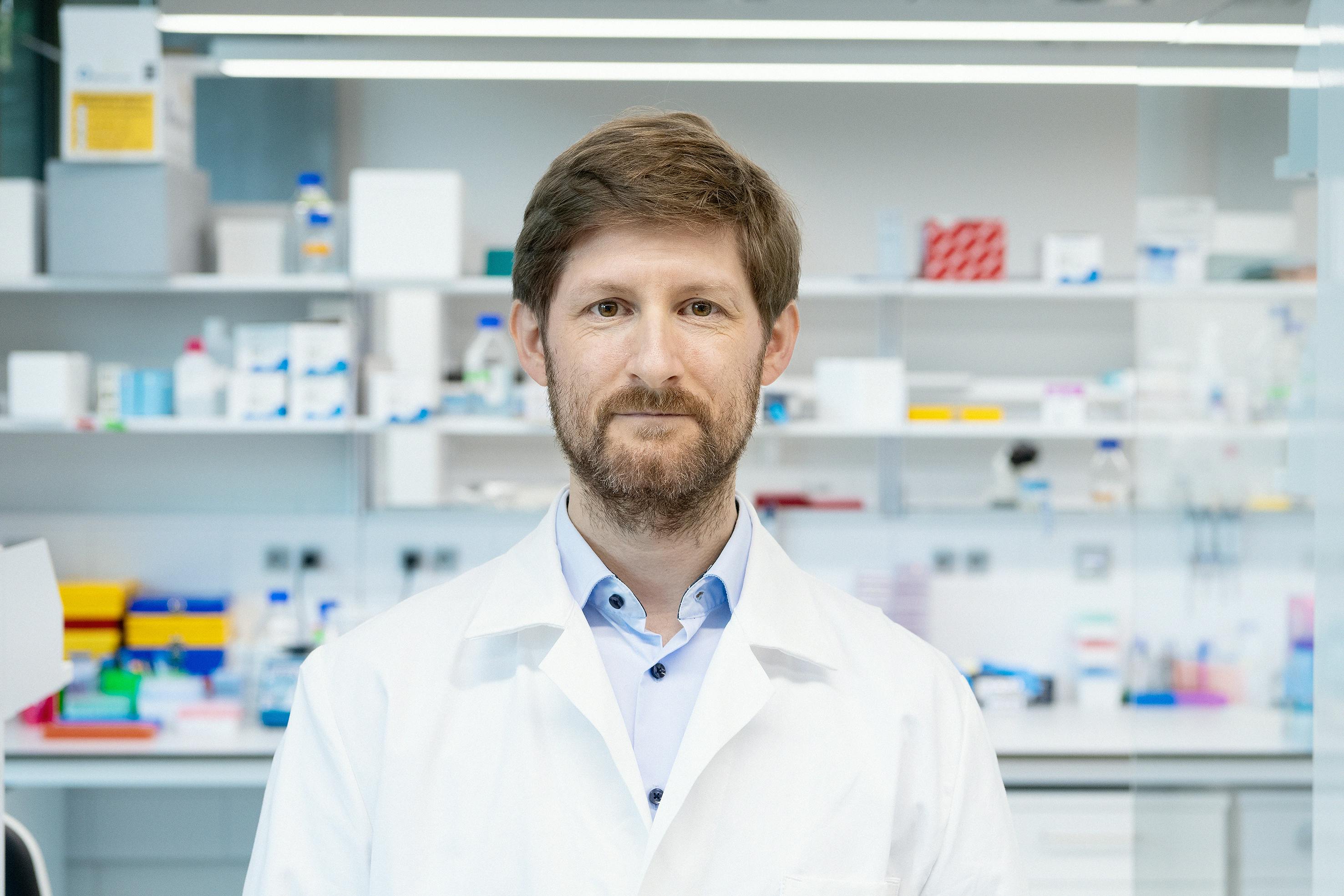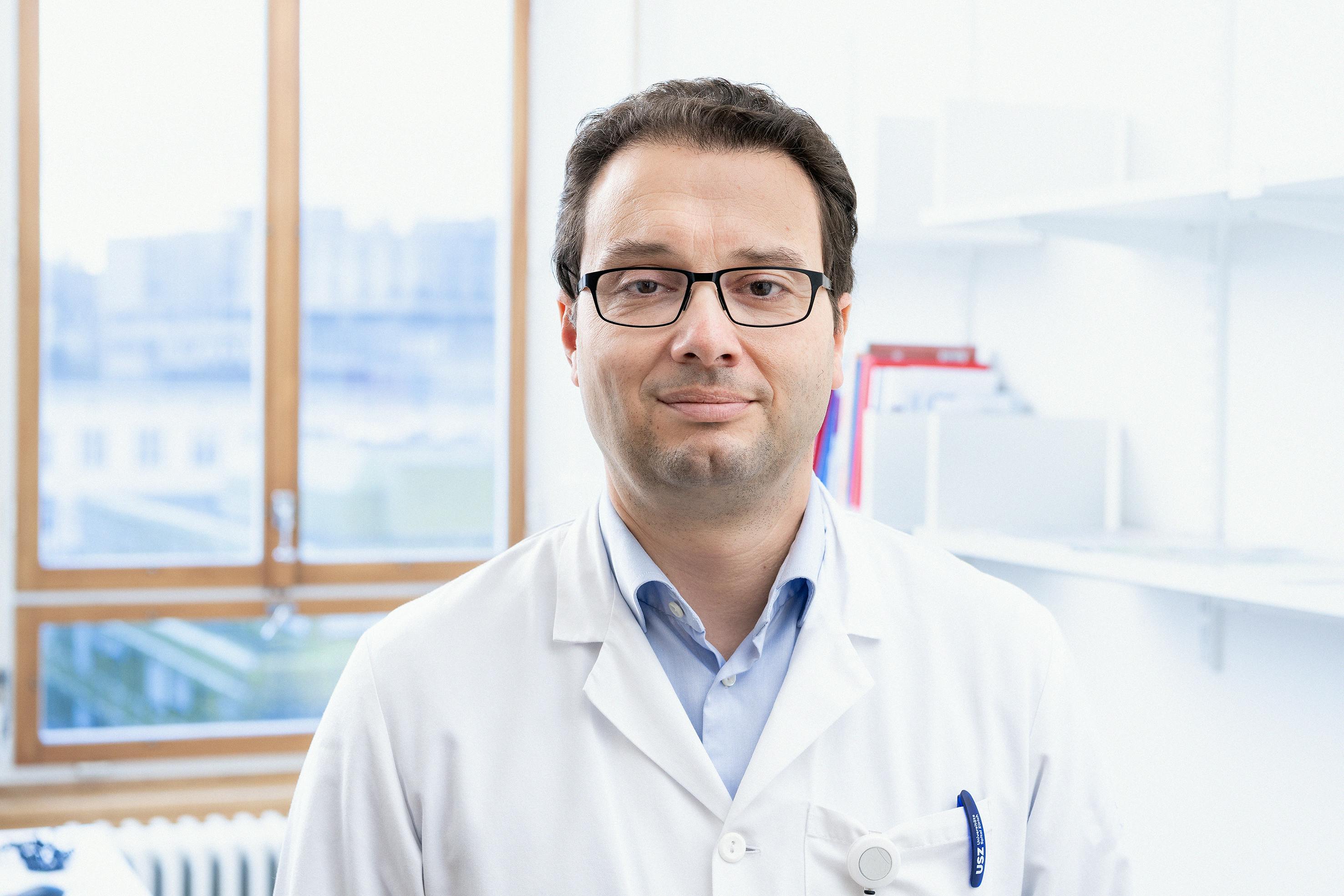
Hard on the heels of tumors
The objective of the Tumor Profiler project, which is made up of seven research platforms, is to identify the molecular profile of a cancerous tumor and offer the patient a personalized treatment within a very short time. The initial results are promising.
Contact
Prof. Dr. med. Andreas Wicki
Professor for Oncology at the University of Zurich
Clinical Director of the Tumor Center at University Hospital Zurich
+41 44 255 21 54
E-Mail
Institutions
University of Zurich
ETH Zurich
University Hospital Basel
Team
Modern medicine can cure many diseases, but there is one diagnosis that still strikes fear into people’s hearts, even in the 21st century, and that is cancer. Patients with certain types of cancer nowadays have a good chance of making a full recovery, but often cancers do not respond to treatment at all or only in some cases. This is why researchers are urgently investigating new approaches in cancer medicine. In the Tumor Profiler project, around one hundred researchers and clinicians from the University of Zurich, the Swiss Federal Institute of Technology Zurich (ETH) and the University Hospital Basel have joined forces to identify new ways of researching and treating cancer.
Deciphering the profile
How does cancer occur? How does the cellular composition of a tumor change its malignant properties? These are the key questions, but they are difficult to answer. They play a decisive role in the understanding of cancer and in enabling physicians to guarantee patients a permanent cure. “Traditionally, cancers have always been described using the name of the organ where they first occur, such as lung cancer, breast cancer or bowel cancer. But we now know that this is not only an outdated view of the situation, but also one that is not always correct,” says Andreas Wicki, chief of service in oncology at University Hospital Zurich, professor at the University of Zurich and one of the directors of the Tumor Profiler project. Tumors that occur in different organs can be more similar to one another in biological terms than different types of tumors from the same organ, according to Wicki. “Both the prognosis and the sensitivity of the tumor depend more on genetic and molecular features.” These have to be carefully analyzed so that the weak point of the cancer can be targeted.
Proteins as pieces of the puzzle
In the Tumor Profiler project, the researchers aim to understand the cancer of every affected person right down to the cellular level. Seven research platforms have combined their expertise to achieve this. Using complementary scientific procedures, they analyze samples, including tissue, bodily fluids and blood, from people with cancer. They also investigate genetic factors, such as DNA, RNA and the proteins in the cancer cells, for example. Proteins are important pieces of the puzzle. They are also described as the molecular workhorses of the cells. Their correct functioning determines the cell’s ability to function and therefore also that of the person. However, the analyses cover not only tumor cells, but also cells from the immune system and the effect of medicines on the tumor cells. Finally, the researchers are searching for biomarkers that indicate the ideal treatment for a patient. If you can identify these genetic fingerprints of the tumor cells, you can provide targeted treatment for the cancer. “Our approach guarantees an unparalleled insight into each individual person’s cancer,” says Andreas Wicki in summary. The joint objective is to use the analysis data that have been gathered to propose therapies to the oncologist who is treating the patient. In the Tumor Profiler project, the scientific procedure also represents a new, long-term approach. It relies on big data, in other words, large volumes of data from many patients. Using comparisons and combinations from the evaluation of the data, it will be possible to identify new biological tumor types and develop appropriate therapies in the future.

Tumour cells embedded in the tissue are stained magenta (Photo: Bodenmiller Lab, University of Zurich).
From the lab to the hospital bed in only four weeks
However, the researchers firstly wanted to discover using a feasibility study whether the cooperation between the research platforms was working and whether treatment proposals could be provided to the physicians within only four weeks. This is because it was important for the patients to be able to benefit directly from the research results while the treatment could still be useful.
Therefore, the Tumor Profiler project started three years ago with 240 patients suffering from metastatic malignant melanoma, metastatic ovarian cancer or acute myeloid leukemia. During the diagnosis phase, samples were taken from the study participants. The sensitive cells had to be sent out to the seven laboratories as quickly as possible. They then had two weeks to evaluate the biopsy samples. This was a major logistical challenge.
“One sample can produce 43,000 individual data points,” explains Wicki. Since no single person can evaluate this quantity of data, this is where the Leonhard Med Secure Scientific Platform Service of the ETH Zurich comes in. The data specialists working for the Leonhard Med platform use algorithms to analyze the data and prepare the results for a pre-tumor board. This expert committee evaluates the data and passes its findings to the molecular tumor board, which is the last link in the chain. Here the oncologists decide on the specific treatment for their patients. It is a huge achievement to go from the lab to the hospital bed in only four weeks.
Promising results for ovarian cancer, melanoma and leukemia
The researchers were able to achieve positive results for the 95 patients with metastatic malignant melanoma. Around one third of the cancer patients who had exhausted all the possible therapy options were treated with an individual mix of medications based on the research results and their tumors shrank.
“The results for the study participants with metastatic ovarian cancer were also noteworthy,” says Viola Heinzelmann-Schwarz, professor at the University of Basel and senior physician in gynecological oncology at the University Hospital Basel. She heads the Tumor Profiler subproject on ovarian cancer. Cancer in this stage is aggressive and only 30 percent of patients can expect to live for five years, explains Heinzelmann-Schwarz. Some respond well to the platinum-based chemotherapy that has been the standard treatment since the 1990s, but others respond less well or not all. This last group can expect to live for only 24 months, because too little research has been carried out into alternative therapies and too little is known about the biology of the carcinoma.
“In the entire cohort of 81 patients, a modification of the existing treatment was proposed on the basis of the research data in 76 percent of cases. For patients who did not respond to the platinum-based chemotherapy, this was true of 81 percent of cases,” says Heinzelmann-Schwarz. In a study which is to start shortly (OV Precision) in the Tumor Profiler project under the leadership of Viola Heinzelmann-Schwarz, the researchers will examine the evidence of the extent to which these alternative therapies can help patients in reality and investigate whether these will become the treatments of the future.
For the 23 patients with acute myeloid leukemia who had exhausted all the possible treatment options, the results were also positive, explains privatdozent Alexandre Theocharides from the University of Zurich, who is the head of the Tumor Profiler project for leukemia. “Using pharmacoscopy, which involves screening drugs in individual cancer cells in real time, it was possible to confirm that individual tumor cells did not respond at all to specific medicines and to identify medicines that proved effective against the tumor cells.”
The detailed results of the studies will be published in early 2023 in a variety of scientific journals. Information about the set-up was published in the prominent journal Cancer Cell in 2021.
Large volumes of data are the key
The next step is to continue the work with a larger group of patients. “In the medium term, we are aiming to carry out detailed analyses of the tumor samples of as many patients as possible,” says Bernd Bodenmiller, professor of quantitative biomedicine at the University of Zurich and professor at ETH Zurich. “Using new technologies, we will be able to identify new biomarkers from this huge pool of data.” The objective is to develop personalized treatments targeted at the properties of a specific tumor. The Tumor Profiler project is setting up a precision oncology platform with the aim of making the clinical and diagnostic data available in structured form.
In the future, we will no longer refer to breast, lung or bowel cancer, but instead to molecular tumor types that can be targeted at a cell level.
In an interview with the health insurance company CSS, Andreas Wicki explains why more precision medicine is needed in cancer research (text in German)

Bernd Bodenmiller is the Director of the Department of Quantitative Biomedicine at the University of Zurich and Professor in the Department of Biology at ETH Zurich. He is the Director of one of the seven research platforms involved in assessing patient samples.
Understanding the tumor ecosystem
Mr. Bodenmiller, what exactly are you investigating when you receive samples from biopsies?
Bodenmiller: The tissue sections contain tumor cells, immune cells, and other cells – just as they are found in the patient’s body. The samples are analyzed in our laboratory, and the data is assessed using algorithms. We have developed a unique method that allows us to investigate and visualize dozens of markers at the same time. We look at immune cells and tumor cells and see how they behave in spatial terms and what their potential for communication might be. This gives us a comprehensive picture of the state of the tumor. We get to know the tumor ecosystem, so to speak, and the possible options for disrupting its function through drugs.
Can you predict how the tumor will react to a given therapy?
Once we have a comprehensive picture of a tumor, we can estimate whether a patient will show a good response to a given established therapy. In cases where patients have exhausted the standard therapies, it was often hard for oncologists to identify other effective therapies. It is these patients who have benefited from the Tumor Profiler.
Do you also test how drugs affect tumor cells?
Yes. In Switzerland, Swissmedic has approved around 180 cancer drugs, of which around 60 are in regular use. There are two Tumor Profiler research platforms that are working with these established drugs, or with a mix of drugs, and conducting ex vivo tests on how tumor cells react to them. It is a case of understanding which processes within the cell are influenced by which drugs.
Listen
Andreas Wicki (Audio file in German)
“We collect and analyze 43,000 data points for each tumor sample”
Professor Andreas Wicki is the Professor for Oncology at the University of Zurich and Clinical Director of the Tumor Center at University Hospital Zurich. Since 2016, he has headed the Tumor Profiler Center in Zurich.

Bernd Bodenmiller (Audio file in German)
“I find it fascinating how cells in tumor tissue form a kind of microorganism”
Professor Bernd Bodenmiller is the Professor for Quantitative Biomedicine at the University of Zurich and ETH Zurich.

Viola Heinzelmann-Schwarz (Audio file in German)
“We would treat around three-quarters of patients differently based on cell analyses”
Professor Viola Heinzelmann-Schwarz is a senior physician in gynecological oncology at University Hospital Basel and a professor at the University of Basel. She heads the Tumor Profiler sub-project on testicular cancer.

Laura Boos (Audio file in German)
“We can immediately implement scientific advances in our day-to-day clinical work”
Dr. Laura Boos is a resident oncologist at University Hospital Zurich and an academic associate at the University of Zurich.

Services
Want to know more about the Tumor Profiler?
For information on the research project and the latest results, please visit the Tumor Profiler website.
Would you like a second opinion?
The center of excellence known as the Comprehensive Cancer Center Zurich offers you quick and easy access to a cross-disciplinary range of oncology expertise.
Glossary
Precision medicine (previously known as personalized medicine):
Every person is different. The ways in which we fall ill and recover also differ. In the field of medicine, it is already important to take into consideration individual factors such as age, gender and pre-existing conditions when treating a patient. Precision medicine combines genetic analyses with other technologies from molecular and cell biology, imaging, computing, and data analysis to generate incorporates new and comprehensive genetic and molecular data and information from medical imaging processes using the latest medical technologies and data analysis tools. This makes it possible to give a much more accurate diagnosis and to identify treatments that are tailor-made for the patient.
RNA:
Ribonucleic acid is a molecule found in every cell of a living being. RNA transports and translates information stored in DNA.
Biopsy:
During a biopsy, health care professionals take a sample from an area of tissue showing noticeable changes.
Big data:
Big data is the evaluation of large volumes of data from a wide variety of sources. Data of this kind are playing an increasingly crucial role in both research and business.
Ex vivo:
Refers to processes where tissue samples (following removal) are studied in isolation in the laboratory.
Acute myeloid leukemia:
Acute myeloid leukemia (AML) is a malignant cancer of the blood-forming system. It affects blood stem cells of various white and red blood cells and also platelets. The blood cancer stem cells proliferate massively, spread to the bone marrow and blood, and may attack other organs.
Credits
Text and audio: Marita Fuchs, Rebekka Haefeli
Pictures: Frank Brüderli
University of Zurich: Andreas Wicki, Laura Boos, Bernd Bodenmiller
ETH Zurich: Bernd Bodenmiller
University Hospital Basell: Viola Heinzelmann-Schwarz





